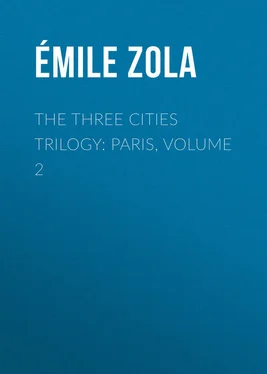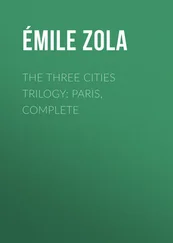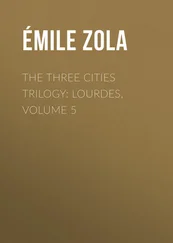Émile Zola - The Three Cities Trilogy - Paris, Volume 2
Здесь есть возможность читать онлайн «Émile Zola - The Three Cities Trilogy - Paris, Volume 2» — ознакомительный отрывок электронной книги совершенно бесплатно, а после прочтения отрывка купить полную версию. В некоторых случаях можно слушать аудио, скачать через торрент в формате fb2 и присутствует краткое содержание. Жанр: literature_19, foreign_antique, foreign_prose, на английском языке. Описание произведения, (предисловие) а так же отзывы посетителей доступны на портале библиотеки ЛибКат.
- Название:The Three Cities Trilogy: Paris, Volume 2
- Автор:
- Жанр:
- Год:неизвестен
- ISBN:нет данных
- Рейтинг книги:4 / 5. Голосов: 1
-
Избранное:Добавить в избранное
- Отзывы:
-
Ваша оценка:
- 80
- 1
- 2
- 3
- 4
- 5
The Three Cities Trilogy: Paris, Volume 2: краткое содержание, описание и аннотация
Предлагаем к чтению аннотацию, описание, краткое содержание или предисловие (зависит от того, что написал сам автор книги «The Three Cities Trilogy: Paris, Volume 2»). Если вы не нашли необходимую информацию о книге — напишите в комментариях, мы постараемся отыскать её.
The Three Cities Trilogy: Paris, Volume 2 — читать онлайн ознакомительный отрывок
Ниже представлен текст книги, разбитый по страницам. Система сохранения места последней прочитанной страницы, позволяет с удобством читать онлайн бесплатно книгу «The Three Cities Trilogy: Paris, Volume 2», без необходимости каждый раз заново искать на чём Вы остановились. Поставьте закладку, и сможете в любой момент перейти на страницу, на которой закончили чтение.
Интервал:
Закладка:
Émile Zola
The Three Cities Trilogy: Paris, Volume 2
BOOK II
I
REVOLUTIONISTS
IN that out-of-the-way street at Neuilly, along which nobody passed after dusk, Pierre's little house was now steeped in deep slumber under the black sky; each of its shutters closed, and not a ray of light stealing forth from within. And one could divine, too, the profound quietude of the little garden in the rear, a garden empty and lifeless, benumbed by the winter cold.
Pierre had several times feared that his brother would faint away in the cab in which they were journeying. Leaning back, and often sinking down, Guillaume spoke not a word. And terrible was the silence between them – a silence fraught with all the questions and answers which they felt it would be useless and painful to exchange at such a time. However, the priest was anxious about the wound, and wondered to what surgeon he might apply, desirous as he was of admitting only a sure, staunch man into the secret, for he had noticed with how keen a desire to disappear his brother had sought to hide himself.
Until they reached the Arc de Triomphe the silence remained unbroken. It was only there that Guillaume seemed to emerge from the prostration of his reverie. "Mind, Pierre," said he, "no doctor. We will attend to this together."
Pierre was on the point of protesting, but he realised that it would be useless to discuss the subject at such a moment, and so he merely waved his hand to signify that he should act in spite of the prohibition were it necessary. In point of fact, his anxiety had increased, and, when the cab at last drew up before the house, it was with real relief that he saw his brother alight without evincing any marked feebleness. He himself quickly paid the driver, well-pleased, too, at finding that nobody, not even a neighbour, was about. And having opened the door with his latch key, he helped the injured man to ascend the steps.
A little night lamp glimmered faintly in the vestibule. On hearing the door open, Pierre's servant, Sophie, had at once emerged from the kitchen. A short, thin, dark woman of sixty, she had formed part of the household for more than thirty years, having served the mother before serving the son. She knew Guillaume, having seen him when he was a young man, and doubtless she now recognised him, although well-nigh ten years had gone by since he had last crossed that threshold. Instead of evincing any surprise, she seemed to consider his extraordinary return quite natural, and remained as silent and discreet as usual. She led, indeed, the life of a recluse, never speaking unless her work absolutely required it. And thus she now contented herself with saying: "Monsieur l'Abbe, Monsieur Bertheroy is in the study, and has been waiting there for a quarter of an hour."
At this Guillaume intervened, as if the news revived him: "Does Bertheroy still come here, then? I'll see him willingly. His is one of the best, the broadest, minds of these days. He has still remained my master."
A former friend of their father, – the illustrious chemist, Michel Froment, – Bertheroy had now, in his turn, become one of the loftiest glories of France, one to whom chemistry owed much of the extraordinary progress that has made it the mother-science, by which the very face of the earth is being changed. A member of the Institute, laden with offices and honours, he had retained much affection for Pierre, and occasionally visited him in this wise before dinner, by way of relaxation, he would say.
"You showed him into the study? All right, then, we will go there," said the Abbe to the servant. "Light a lamp and take it into my room, and get my bed ready so that my brother may go to bed at once."
While Sophie, without a word or sign of surprise, was obeying these instructions, the brothers went into their father's former laboratory, of which the priest had now made a spacious study. And it was with a cry of joyous astonishment that the savant greeted them on seeing them enter the room side by side, the one supporting the other. "What, together!" he exclaimed. "Ah! my dear children, you could not have caused me greater pleasure! I who have so often deplored your painful misunderstanding."
Bertheroy was a tall and lean septuagenarian, with angular features. His yellow skin clung like parchment to the projecting bones of his cheeks and jaw. Moreover, there was nothing imposing about him; he looked like some old shop-keeping herbalist. At the same time he had a fine, broad, smooth brow, and his eyes still glittered brightly beneath his tangled hair.
"What, have you injured yourself, Guillaume?" he continued, as soon as he saw the bandaged hand.
Pierre remained silent, so as to let his brother tell the story as he chose. Guillaume had realised that he must confess the truth, but in simple fashion, without detailing the circumstances. "Yes, in an explosion," he answered, "and I really think that I have my wrist broken."
At this, Bertheroy, whose glance was fixed upon him, noticed that his moustaches were burnt, and that there was an expression of bewildered stupor, such as follows a catastrophe, in his eyes. Forthwith the savant became grave and circumspect; and, without seeking to compel confidence by any questions, he simply said: "Indeed! an explosion! Will you let me see the injury? You know that before letting chemistry ensnare me I studied medicine, and am still somewhat of a surgeon."
On hearing these words Pierre could not restrain a heart-cry: "Yes, yes, master! Look at the injury – I was very anxious, and to find you here is unhoped-for good fortune!"
The savant glanced at him, and divined that the hidden circumstances of the accident must be serious. And then, as Guillaume, smiling, though paling with weakness, consented to the suggestion, Bertheroy retorted that before anything else he must be put to bed. The servant just then returned to say the bed was ready, and so they all went into the adjoining room, where the injured man was soon undressed and helped between the sheets.
"Light me, Pierre," said Bertheroy, "take the lamp; and let Sophie give me a basin full of water and some cloths." Then, having gently washed the wound, he resumed: "The devil! The wrist isn't broken, but it's a nasty injury. I am afraid there must be a lesion of the bone. Some nails passed through the flesh, did they not?"
Receiving no reply, he relapsed into silence. But his surprise was increasing, and he closely examined the hand, which the flame of the explosion had scorched, and even sniffed the shirt cuff as if seeking to understand the affair better. He evidently recognised the effects of one of those new explosives which he himself had studied, almost created. In the present case, however, he must have been puzzled, for there were characteristic signs and traces the significance of which escaped him.
"And so," he at last made up his mind to ask, carried away by professional curiosity, "and so it was a laboratory explosion which put you in this nice condition? What devilish powder were you concocting then?"
Guillaume, ever since he had seen Bertheroy thus studying his injury, had, in spite of his sufferings, given marked signs of annoyance and agitation. And as if the real secret which he wished to keep lay precisely in the question now put to him, in that powder, the first experiment with which had thus injured him, he replied with an air of restrained ardour, and a straight frank glance: "Pray do not question me, master. I cannot answer you. You have, I know, sufficient nobility of nature to nurse me and care for me without exacting a confession."
"Oh! certainly, my friend," exclaimed Bertheroy; "keep your secret. Your discovery belongs to you if you have made one; and I know that you are capable of putting it to the most generous use. Besides, you must be aware that I have too great a passion for truth to judge the actions of others, whatever their nature, without knowing every circumstance and motive."
Читать дальшеИнтервал:
Закладка:
Похожие книги на «The Three Cities Trilogy: Paris, Volume 2»
Представляем Вашему вниманию похожие книги на «The Three Cities Trilogy: Paris, Volume 2» списком для выбора. Мы отобрали схожую по названию и смыслу литературу в надежде предоставить читателям больше вариантов отыскать новые, интересные, ещё непрочитанные произведения.
Обсуждение, отзывы о книге «The Three Cities Trilogy: Paris, Volume 2» и просто собственные мнения читателей. Оставьте ваши комментарии, напишите, что Вы думаете о произведении, его смысле или главных героях. Укажите что конкретно понравилось, а что нет, и почему Вы так считаете.












